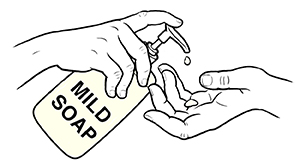Vaginitis is infection or inflammation of the vagina or the outside opening of it (vulva). Vaginitis can be caused by bacteria, yeast, and sexually transmitted infections. Other causes include certain chemicals such as those in perfumes, soaps, detergents, or spermicides. You can help prevent vaginitis. Follow the tips below. And see your health care provider if you have any symptoms.
Hygiene
-
Stay away from chemicals. Don't use vaginal sprays. Don't use scented toilet paper or pads or tampons that are scented. Sprays and scents have chemicals that can irritate your vagina.
-
Don't douche unless you are told to by your health care provider. Douching is rarely needed. And it upsets the normal balance in the vagina.
-
Wash yourself well. Wash the outer vaginal area (vulva) every day with mild, unscented soap. Keep it as dry as possible.
-
Wipe correctly. Make sure to wipe from front to back after a bowel movement. This helps to keep from spreading bacteria from your anus to your vagina.
-
Change your tampon often. During your period, make sure to change your tampon as often as directed on the package. This allows the normal flow of vaginal discharge and blood.
Lifestyle
-
Limit your number of sexual partners. The more partners you have, the greater your risk of infection. Using condoms helps reduce your risk.
-
Get enough sleep. Sleep helps keep your body’s immune system healthy. This helps you fight infection.
-
Lose weight, if needed. Excess weight can reduce air circulation around your vagina. This can increase your risk of infection.
-
Exercise regularly. Regular activity helps keep your body healthy.
-
Take antibiotics only as directed. Antibiotics can change the normal chemical balance in the vagina.
Clothing
-
Don’t sit in wet clothes. Yeast thrives when it’s warm and damp.
-
Don’t wear tight pants. And don’t wear tights, nylon underpants, leggings, or hose without a cotton crotch or cotton lining. These types of clothing trap warmth and moisture.
-
Wear cotton underwear. Cotton lets air circulate around the vagina.
Symptoms of vaginitis
-
Irritation, swelling, or itching of the genital area
-
Vaginal discharge
-
Bad vaginal odor
-
Pain or burning during urination
Featured in


